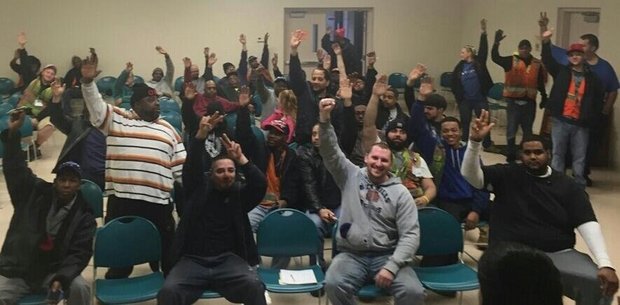Detroit Chassis in Avon averts strike by accepting temp workers in union

AVON, Ohio – Less than a day before temporary workers at the Detroit Chassis plant on Chester Industrial Parkway were scheduled to strike, the company agreed to their request to join a union.
The plant is staffed by about 60 workers – all of them temps — who make between $9.50 and $11.50 an hour, according to workers helping with the organizing effort to have the UAW represent them. The workers want permanent full-time employment and better wages and benefits. Their duties include assembling axles for the F-650 and F-750 trucks being made at Ford’s Ohio Assembly Plant in nearby Avon Lake.
“(W)orkers won a commitment from Detroit Chassis that averts a strike and sets in motion a process that will allow workers to achieve their goals—forming a union with the UAW, making them solely employees of Detroit Chassis rather than contracted temporary workers, and bargaining a fair contract that will transform these workers’ lives,” said Ken Lortz, UAW’s Region 2B director, in an email. “We will begin working with Detroit Chassis immediately to make these changes a reality.”
Detroit Chassis is choosing not to discuss the matter.
“It is our Company policy that we do not comment publicly on pending labor relations matters,” reads an emailed company statement.
Workers successfully organizing to join a union isn’t that unusual. However, it is unusual for temp workers to unionize.
“What happened here in Avon, Ohio, is the first time I remember seeing temporary workers stand up and say ‘enough is enough,'” Lortz said in the email.
Successfully organizing is also unusual for these low-wage temps because they are in the auto parts industry, where workers have experienced declining wages for years. For example, workers at the Camaco plant in Lorain have been trying to get a union for a few years in the hope of winning higher wages. Auto parts plants now employ three-fourths of all auto workers in the country, according to the liberal National Employment Law Project.
A 2014 NELP report, “Manufacturing Low Pay: Declining Wages in the Jobs that Built America’s Middle Class,” declining salaries among these workers. In Ohio, one-quarter of all manufacturing workers made less than $12.43 per hour, it found. As late as 2006 – the year before the start of the Great Recession — such jobs paid significantly more than the average private sector wage.
The increase in using temporary workers has contributed to the low-wage trend, said Sarah Leberstein, a NELP senior staff attorney.
“The plant that is benefiting from their labor is contracting with a staffing agency, even while it may call the shots about what they do, what they get paid and whether or not they get benefits,” she said.
Leberstein said this has proven problematic because the temps are usually paid less and receive no benefits, even though they often work along side permanent employees, usually making higher salaries with benefits. She said it was unusual for an entire plant to be staffed with temporary workers such as at Detroit Chassis.
“Workers are often on hold, months week or maybe even years waiting for full-time permanent employment,” she said.
When Philaedonna Wade went to work at Detroit Chassis as a temporary worker about eight months ago, she said she was led to believe she would be eligible for permanent employment after 30 days. She makes $9.50 an hour, and believes no one working at the facility should make less than about $12, especially when one considers the price of the Ford trucks they help make can sell for more than $60,000.
“I thought this was an opportunity to improve my life,” she said of what she believed was a chance to be hired full-time. “Then it looked like it was turning out to be a lie.”
Wade said she was confused why the company was paying low wages when it emphasized quality in the production process.
“Usually when you want quality, you are willing to pay for it,” she said.
Dave Perrier, one of the workers helping to organize the union, said he hired on as a temp a year-and-a-half ago. He said he was among the first workers at the plant and was given no guarantees of being made permanent. Perrier said after a year on the job, he asked to take vacation.
“I found out that there would be no vacation pay approved for anyone,” said Perrier, who makes $11. “That was rather frustrating. After a year of working some place, you weren’t going to be granted any vacation time?”
Workers said they began speaking frequently among themselves about the low pay, no benefits and no chance at permanent employment. They decided to organize to get a union. Perrier said everyone knew they risked being fired because they had no job security. But he said the workers also knew their value. Without them, Perrier said it would take no more than a day to potentially shut down the Ford plant for lack of auto parts.
He said these apparently vulnerable workers were able to tap into the one strength they had in order to form a union.
“It couldn’t have happened if we couldn’t have stuck together,” Perrier said. “Everyone was on board.”
Originally posted in Labor Notes.